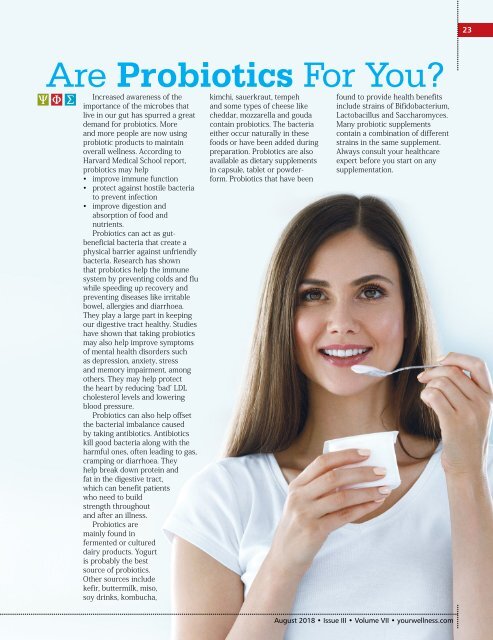You also want an ePaper? Increase the reach of your titles
YUMPU automatically turns print PDFs into web optimized ePapers that Google loves.
23<br />
Are Probiotics For You?<br />
Increased awareness of the<br />
importance of the microbes that<br />
live in our gut has spurred a great<br />
demand for probiotics. More<br />
and more people are now using<br />
probiotic products to maintain<br />
overall wellness. According to<br />
Harvard Medical School report,<br />
probiotics may help<br />
• improve immune function<br />
• protect against hostile bacteria<br />
to prevent infection<br />
• improve digestion and<br />
absorption of food and<br />
nutrients.<br />
Probiotics can act as gutbeneficial<br />
bacteria that create a<br />
physical barrier against unfriendly<br />
bacteria. Research has shown<br />
that probiotics help the immune<br />
system by preventing colds and flu<br />
while speeding up recovery and<br />
preventing diseases like irritable<br />
bowel, allergies and diarrhoea.<br />
They play a large part in keeping<br />
our digestive tract healthy. Studies<br />
have shown that taking probiotics<br />
may also help improve symptoms<br />
of mental health disorders such<br />
as depression, anxiety, stress<br />
and memory impairment, among<br />
others. They may help protect<br />
the heart by reducing ‘bad’ LDL<br />
cholesterol levels and lowering<br />
blood pressure.<br />
Probiotics can also help offset<br />
the bacterial imbalance caused<br />
by taking antibiotics. Antibiotics<br />
kill good bacteria along with the<br />
harmful ones, often leading to gas,<br />
cramping or diarrhoea. They<br />
help break down protein and<br />
fat in the digestive tract,<br />
which can benefit patients<br />
who need to build<br />
strength throughout<br />
and after an illness.<br />
Probiotics are<br />
mainly found in<br />
fermented or cultured<br />
dairy products. Yogurt<br />
is probably the best<br />
source of probiotics.<br />
Other sources include<br />
kefir, buttermilk, miso,<br />
soy drinks, kombucha,<br />
kimchi, sauerkraut, tempeh<br />
and some types of cheese like<br />
cheddar, mozzarella and gouda<br />
contain probiotics. The bacteria<br />
either occur naturally in these<br />
foods or have been added during<br />
preparation. Probiotics are also<br />
available as dietary supplements<br />
in capsule, tablet or powderform.<br />
Probiotics that have been<br />
found to provide health benefits<br />
include strains of Bifidobacterium,<br />
Lactobacillus and Saccharomyces.<br />
Many probiotic supplements<br />
contain a combination of different<br />
strains in the same supplement.<br />
Always consult your healthcare<br />
expert before you start on any<br />
supplementation.<br />
<strong>August</strong> <strong>2018</strong> • Issue III • Volume VII • yourwellness.com



